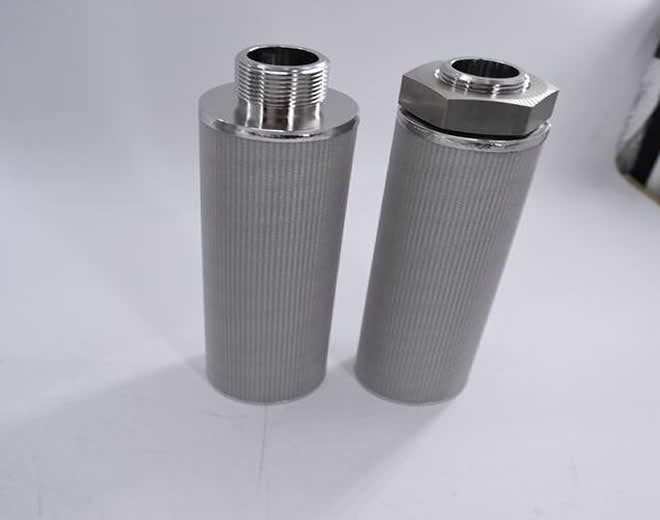
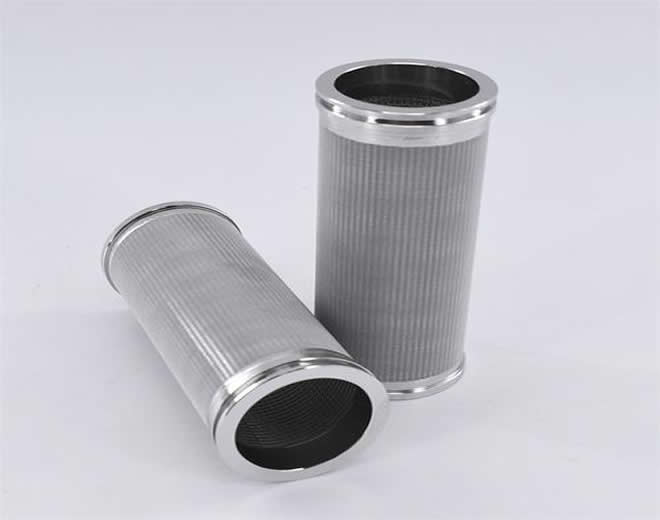
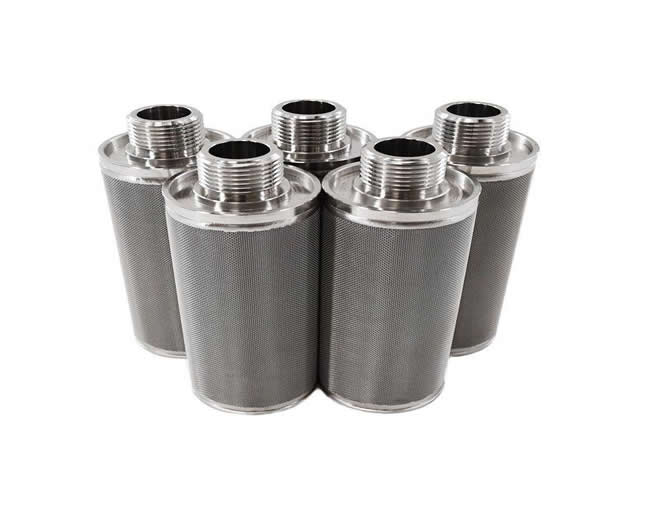
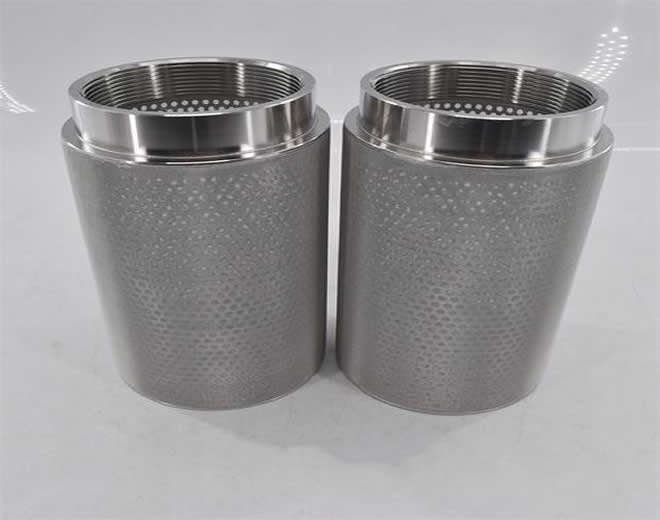
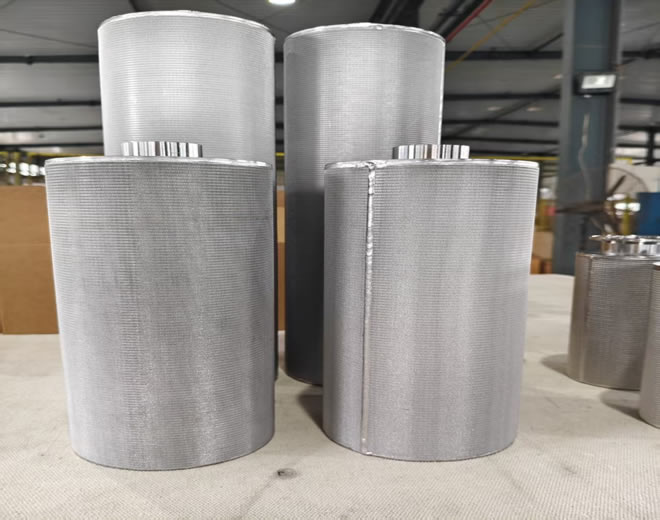





The reliability of hydraulic systems, the "muscles" and "blood vessels" of modern industrial equipment, is directly tied to fluid cleanliness. Statistics indicate that over 70% of hydraulic system failures originate from fluid contamination. The hydraulic oil sintered wire mesh filter cartridge, a high-performance surface filtration element, serves as a "Robust Guardian" for protecting precision hydraulic components and ensuring system stability. It is renowned for its exceptional mechanical strength, superior resistance to shock, and long service life.
A hydraulic oil sintered wire mesh filter cartridge is a multi-layer stainless steel sintered mesh cartridge specifically engineered for hydraulic fluid filtration. It is constructed by layering multiple sheets (typically three or five) of stainless steel woven wire mesh with varying pore sizes, which are then diffusion-bonded into a single, monolithic structure through a high-temperature vacuum sintering process. This creates a rigid filtering medium characterized by high strength, precise filtration ratings, and an ideal pore gradient.
Exceptional Mechanical Strength and Pressure Differential Tolerance
This is its primary advantage for hydraulic applications. Hydraulic systems experience significant pressure fluctuations, especially during startup or pressure shocks. Sintered mesh cartridges can withstand pressure differentials up to 21 MPa or higher without structural failure or deformation, effectively preventing secondary contamination caused by cartridge rupture.
Excellent Fatigue Resistance
It can endure frequent system pressure cycles and hydraulic shocks without performance degradation, making it ideal for mobile hydraulic equipment with harsh and dynamic operating conditions (e.g., construction machinery).
Precise Surface Filtration and Easy Cleanability
It operates on a surface filtration mechanism, where contaminant particles are retained on the cartridge's surface rather than embedding within it. This allows for thorough and convenient cleaning via back-pulsing, ultrasonic cleaning, or solvent immersion. The cartridge can be reused multiple times with good performance recovery, significantly reducing long-term operating costs.
Wide Range of Filtration Ratings
It offers a broad selection of filtration ratings, from 1 μm to 100 μm and beyond, meeting the requirements of various applications—from low-pressure return lines to high-pressure supply lines—effectively protecting pumps, valves, and cylinders.
Excellent Chemical Compatibility
Manufactured from 304 or 316L stainless steel, it is compatible with all types of hydraulic fluids (mineral oil, synthetic esters, HFC fluids, etc.) and will not degrade to contaminate the fluid.
Good High-Temperature Resistance
It can withstand normal hydraulic operating temperatures and transient thermal shocks. The inherent high-temperature resistance of stainless steel ensures cartridge stability in hot environments.
Hydraulic oil sintered mesh cartridges are widely used in hydraulic systems demanding high reliability and long life:
High-Pressure Line Filtration: Installed after the pump or before sensitive components like servo valves as a high-pressure filter to protect critical parts.
Return Line Filtration: Captures wear particles generated during system operation to maintain reservoir fluid cleanliness.
Off-line Filtration Circuits (Bypass Filtration): Serves as an independent fluid conditioning unit to continuously clean the fluid in the reservoir.
New Fluid Fill Filtration: Ensures that new fluid added to the system is clean, controlling contamination at the source.
Harsh Duty Equipment: Such as construction machinery, injection molding machines, machine tools, marine hydraulic systems, and wind turbine hydraulic systems.
| Feature | Hydraulic Sintered Mesh Cartridge | Standard Paper/Glass Fiber Cartridge |
|---|---|---|
| Strength & Lifespan | Very high, reusable, extremely long overall service life. | Disposable, must be replaced when the pressure differential or service life is reached. |
| Filtration Mechanism | Surface Filtration, easy to clean. | Depth Filtration, contaminants are trapped deep within, cannot be cleaned, must be replaced. |
| Pressure Delta Tolerance | Extremely strong, excellent resistance to pressure shock. | Relatively lower; severe pressure shocks may cause media collapse or rupture. |
| Fatigue Resistance | Excellent, suitable for applications with frequent pressure cycling. | Moderate; frequent shocks may compromise integrity. |
| Initial Cost | Higher. | Lower. |
| Long-Term Cost | Lower (due to reusability). | Higher (ongoing cost of replacement cartridges). |
| Environmental Impact | Reduces waste generation. | Generates more solid waste. |
Rating Selection: Choose the appropriate filtration rating based on the target cleanliness level (e.g., ISO 4406) and the sensitivity of the components being protected. Higher pressure lines typically require finer ratings (e.g., 3-10 μm).
Strength Matching: Ensure the cartridge's pressure differential rating exceeds the system's maximum working pressure and potential shock pressures.
Cleaning and Reuse: When back-flushing, use cleaning solvents compatible with the hydraulic fluid and ensure the cartridge is completely dry before reinstalling. Perform integrity checks periodically.
Bypass Valve Setting: Even with high-strength cartridges, the filter housing should be equipped with a properly set bypass valve to protect the cartridge and system under extreme conditions.